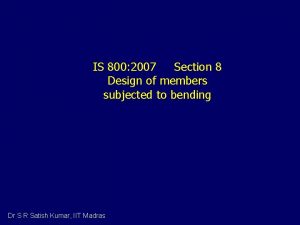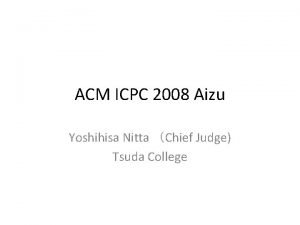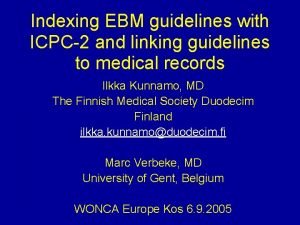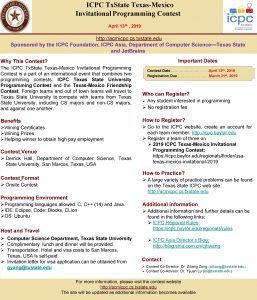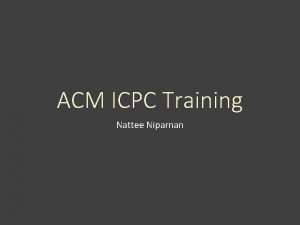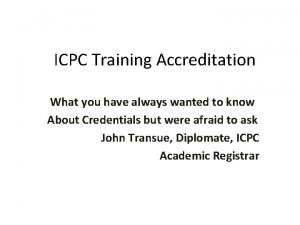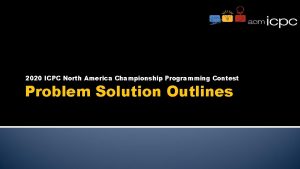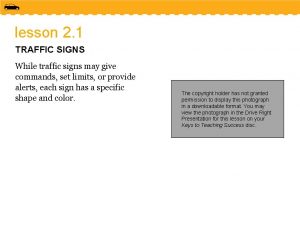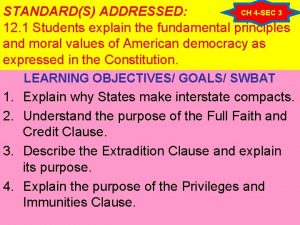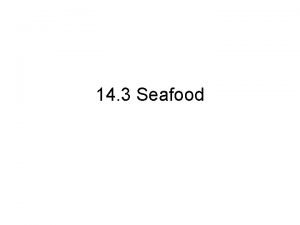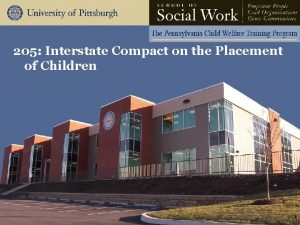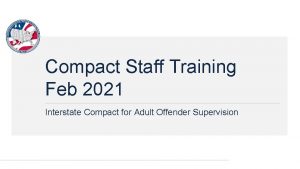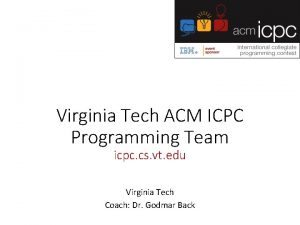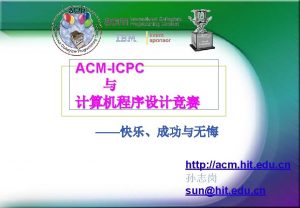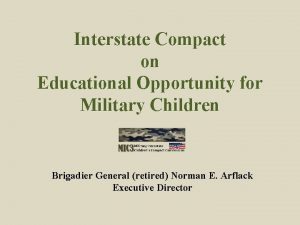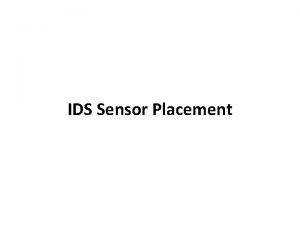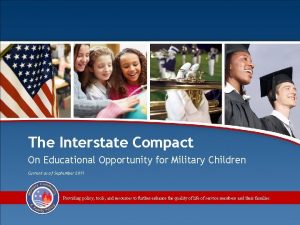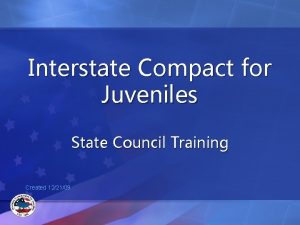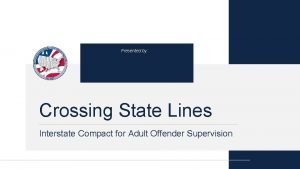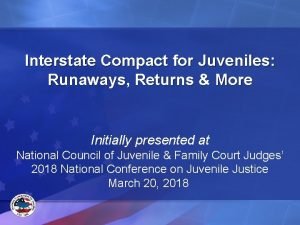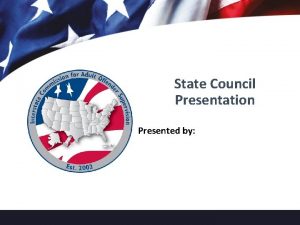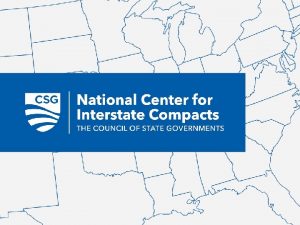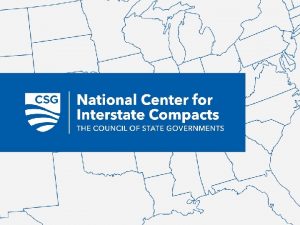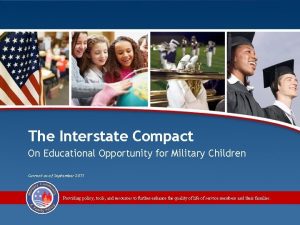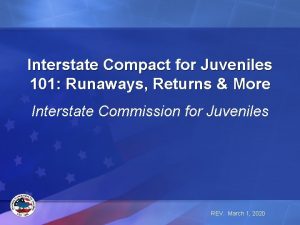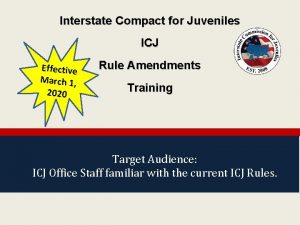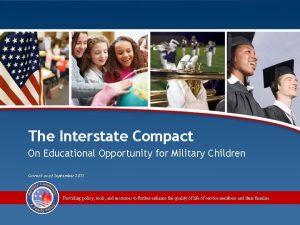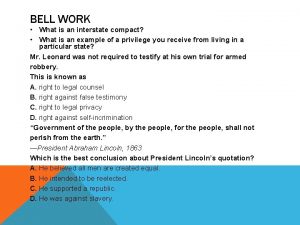INTERSTATE COMPACT ON THE PLACEMENT OF CHILDREN ICPC























- Slides: 23

INTERSTATE COMPACT ON THE PLACEMENT OF CHILDREN (ICPC) • A binding agreement adopted by all 50 states, the District of Columbia, and the US Virgin Islands. • Provides legal and financial protection to children placed out of state. • Ensures safety of the placement prior to the move and continued monitoring after. • ORS 417. 010 – 417. 990 • OAR 413 -040 -0200 – OAR 413 -040 -330

10 Articles ORS 417. 010 – 417. 080 1. Purpose & Policy 2. Definitions 3. Conditions for placement 4. Penalty for illegal placement 5. Retention of Jurisdiction 6. Institutional Care of Delinquent Children 7. Compact Administrator 8. Limitations 9. Enactment and Withdrawal 10. Construction and Severability • Define the types of placements to which ICPC applies • Specify the procedures to be followed when placing a child in another state. • Specify the protections, services and requirements of the ICPC

12 Regulations promulgated by the Association of Adminstrators of the Interstate Compact on the Placement of Children (AAICP) 1. Relocation of Family Units 2. Public Court Jurisdiction Cases: Placements for Public Adoption or Foster Care in Family Settings and/or with Parents/Relatives 3. Definitions and Placement Categories: Applicability and Exemptions 4. Residential Placement 5. Central State Compact Office 6. Permission to Place Child: Time Limitations, Reapplication 7. Expedited Placement Decision 8. Change of Placement Purpose 9. Definition of a Visit 10. Guardians 11. Responsibility of States to Supervise Children 12. Private/Independent Adoptions

• Regulation 1: 1 Applies when already approved placement (ie. certified foster home) resource wishes to move out of state with the child. • Regulation 2: Applies when Child is within the jurisdiction of the Court and/or in the custody of an agency, such as DHS, and the agency seeks to place the child in another state. • Regulation 3: Defines placement categories to which ICPC applies and exemptions. 1. Adoptions: Placement preliminary to an adoption (independent, private or public adoptions) 2. Licensed or approved foster homes (placement with related or unrelated caregivers) 3. Placements with parents and relatives when a parent or relative is not making the placement as defined in Article VIII (a) "Limitations“*** 4. Group homes/residential placement of all children, including adjudicated delinquents in institutions in other states as defined in Article VI and Regulation No. 4. ***State’s are split regarding applicability of ICPC to placement with a parent. Oregon’s view: ICPC applies to placement with a parent. State ex rel. Juvenile Dept. of Clackamas County v. Smith, 107 Or. App. 129, 811 P. 2 d 145 (1991)

Regulation 3 does allow the court to place a child with a parent without going through ICPC, provided that: Ø Child was not removed from that parent; and Ø The court has no evidence before it, and seeks no evidence, that the parent is unfit; and Ø The court dismisses its jurisdiction immediately. Receiving state will have no supervision or monitoring responsibility

REGULATION 7 – PRIORITY PLACEMENT Proposed placement is with: v. Parent v. Step-parent v. Grandparent v. Adult uncle or aunt v. Adult sibling, or v. Legal guardian AND The case meets at least one of the following criteria: üUnexpected dependency due to recent incarceration, incapacitation, or death of a parent or guardian, or üThe child is under 4 years of age, or üThe court finds that any child in the sibling group to be placed has a substantial relationship with the proposed placement, or üThe child is currently in an emergency placement.

REGULATION 7 (CONTINUED) §The receiving state is expected to approve or deny placement within 20 business days. §The child cannot be in the home while a Reg 7 study is being completed. §Some states are not able to comply with Regulation 7 timelines. (i. e. Washington and California)

Court order with specific findings is required to initiate expedited ICPC. Form CF 101 located on DHS website: http: //www. dhs. state. or. us/policy/childwelfare/icpc_tools. html


Visits - ICPC Regulation 9 A child traveling out of state is considered to be on a visit when: • It is for a brief social or cultural experience; and • The visit has a definite end date; and • The visit is no longer than 30 days, or begins and ends within a school vacation; and • There has been no request for a home study or supervision. ICPC is not required for visits. Per Article 1, any request for a home study creates a rebuttable presumption that it is a “placement” rather than a visit. If a home study is in process and a genuine visit is planned, receiving state needs to be notified in advance.

Important to Remember: 1) No placement may occur prior to approval from receiving state’s ICPC office. 2) Court must maintain jurisdiction until appropriate authority in receiving state agrees in writing. (Article 5) 3) Cannot circumvent ICPC by appointing guardian. Department of Human Services v. A. B. , 286 Or. App. 578 (2017) and State ex. Rel. Juvenile Dept. of Curry County v. Campbell, 178 Or. App. 271 (2001)



Prior to ICPC placement, a home study (including criminal background and CPS history checks) must be completed in the receiving state, and placement approval from the receiving state’s ICPC office must be obtained Federal law requires interstate home studies to be completed within 60 days. Placement must be made within 6 months of approval.

Oregon has a “Border Agreements” with Washington and Idaho which can be used in a limited number of cases to obtain “provisional placement” approval within 7 working days. Only certain counties are eligible to use. Washington Placement must be made within 20 calendar days of approval. ICPC continues to apply. Full home study process will still be necessary in order for placement to receive final full approval. Proposed placement must be with a relative or with a person “with whom the child has an established relationship and with whom the child has spent a substantial amount of time. ” Children must be in the legal custody of DHS. Children cannot be physically residing in the home of the prospective placement family (including “visits”) at any time unless and until the placement is approved in writing according to the terms of the border agreement.

COUNTIES ELIGIBLE TO USE THE AGREEMENT In Washington: Benton, Clark, Cowlitz, Franklin, Pacific, Wahiakum, Walla, Skamania and Klickitat In Oregon: Clackamas, Clatsop, Columbia, Morrow, Multnomah, Umatilla, Washington, Sherman, Gilliam, Wasco and Hood River **Idaho Agreement only applies to Malheur and Payette Counties and is limited to 10 cases per year

CONFERENCE OF CHIEF JUSTICES CONFERENCE OF STATE COURT ADMINSTRATORS Resolution 3 In Support of Increased Judicial Involvement to Expedite Movement of Children Under the Interstate Compact on the Placement of Children WHEREAS, the Conference of Chief Justices and the Conference of State Court Administrators understand the need to expedite the placement of abused and neglected children in safe and permanent homes, and that in some cases the best placement is in another state, which requires interstate cooperation and collaboration; and WHEREAS, the Interstate Compact for the Placement of Children (ICPC) provides the structure for interstate cooperation and collaboration for these placements; and WHEREAS, in recent years, efforts have been made to update the ICPC and improve the ICPC process to ensure compliance with federally mandated permanency planning timeframes, including passage of the Safe and Timely Interstate Placement of Foster Children Act of 2006 (Public Law 109 -239); and WHEREAS, despite these efforts, unreasonable delays continue to impede the placement of abused and neglected children in safe and permanent homes; and WHEREAS, state courts in sending states have been unable to effectively intervene with the receiving state or county agencies or state ICPC offices to determine the causes for delay or possible solutions; NOW, THEREFORE, BE IT RESOLVED that the Conference of Chief Justices and the Conference of State Court Administrators encourage all states and jurisdictions subject to the ICPC to adopt legislation that authorizes judges in sending and receiving states and jurisdictions to communicate with one another regarding the placement of children; and BE IT FURTHER RESOLVED that the Conferences encourage all states and jurisdictions subject to the ICPC to adopt legislation that authorizes judges in the receiving state or jurisdiction where placement is sought to hold hearings at the request of judges in sending states or jurisdictions on the status of ICPC home stud requests and enter orders to complete those home studies when they are delayed and timely decisions are not made concerning the children involved. Adopted as proposed by the CCJ/COSCA Courts, Children, and Families Committee at the 2013 Annual Meeting on July 31, 2013. Adopted

ICPC Manager: Vera James MSW, MPH 503 -945 -6685 ICPC Office 500 Summer St. NE, #E-70 Salem, OR 97301 Fax 503 -947 -5072 E-mail: oregon. icpc@state. or. us Case assignments are based on the oldest child’s last name: A – E Amanda Kramer, 503 -945 -5673, amanda. m. kramer@state. or. us F – K Marcy Stenerson, 503 -945 -6260, marcy. m. stenerson@state. or. us L – Q Lillie Axen, 503 -945 -5671, lillian. e. axen@state. or. us R – Z Margie Salazar, 503 -947 -1108, margarita. s. salazar@state. or. us Terrie Anderson (working Mondays and Tuesdays)

ICPC PROCESS Caseworker sends referral to ICPC office documents placement decision and informs case worker. ICPC office reviews packet and sends it to receiving state Receiving state completes home study and approves or denies placement, then sends decision back to sending state ICPC office.

WHY IS THE ICPC NEEDED? Protects the child: üLegal and financial protections üEnsures safety of the placement prior to the move üEnsures continued monitoring after placement

ICPC TIMELINES • ICPC Regulation 7: 20 business days for placement decision • Most states can’t meet this deadline due to foster certification requirements. • Safe and Timely Act: 60 days for a report on the home study • The law does not require a placement decision by the deadline, so usually a preliminary report is provided. • ICPC Regulation 2: 6 months to provide final decision • Approval expires 6 months from the date the 100 A was signed by the receiving state ICPC office

WHY DOES ICPC TAKE SO LONG? • Varies by state • Licensing/certification requirements • Completion of training • Criminal history • Heavy caseloads • ICPC cases given lower priority • Proposed placement resources may be slow in following through • Request lost or never received by the receiving state.

STRATEGIES TO SPEED UP THE ICPC PROCESS • Check in with case worker on a regular basis. • Encourage prospective placement resource to follow through with all required activities in a timely manner. • The prospective placement resource can contact their state ICPC office to check status along the way. The resource can advocate for the home study request to be processed quickly and for the final placement decision to be transmitted promptly to the sending state. • The proposed placement resource also can contact their local child welfare office to request status.
 Web buckling and web crippling slideshare
Web buckling and web crippling slideshare Acm icpc
Acm icpc Icpc adalah
Icpc adalah Icpc-2 codes
Icpc-2 codes Aspek fungsional icpc
Aspek fungsional icpc Kodning af data
Kodning af data Icpc invitational
Icpc invitational Icpc
Icpc Icpc oregon
Icpc oregon Muet id card
Muet id card Icpc neerc
Icpc neerc Icpc training material
Icpc training material Lymfeadenit
Lymfeadenit Icpc training
Icpc training Icpc north america problems
Icpc north america problems What is the proposed route for interstate 11
What is the proposed route for interstate 11 La crosse interstate fair
La crosse interstate fair Local state us and interstate route signs
Local state us and interstate route signs Priveleges and immunities clause
Priveleges and immunities clause Drivers manual alabama
Drivers manual alabama Abram interstate insurance
Abram interstate insurance Which organization monitors interstate fish shipments?
Which organization monitors interstate fish shipments? Chapter 4 section 3
Chapter 4 section 3 Intrastate vs interstate
Intrastate vs interstate
